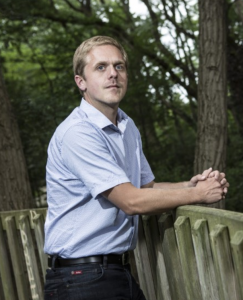The UCL IEEE Student Branch is glad to invite you to the following lecture :
“Rapid delay compensation during closed loop control of eye and arm movements”

given by Frédéric Crevecoeur, who works at UCL/INMA on motor control from an applied mathematics perspective and became an FNRS research associate earlier this year.
The event will be held on Friday February 23rd at 1:00 pm in the BARB01 auditorium. Sandwiches and beverages will be offered by the Student Branch to those who attend the talk. Registration is free but mandatory in order to receive a sandwich, please sign up at the bottom of this page.
Abstract: Weighting priors with sensory evidence in an optimal (Bayesian) way has proven a powerful framework for understanding how humans and animal make efficient decisions in the face of uncertainty. In the context of movement control, the same operation is complicated by the presence of temporal delays affecting the transmission of neural signals along the nerves. In this context, optimal state estimation requires a compensation for the delay through sensory extrapolation, prior to combining the extrapolated sensory data with current beliefs about the state of the limb. Here we will present a series of experiment showing evidence that the nervous system performs similar transformations very quickly, such that long-latency responses to mechanical disturbances (latency ~50-100ms in the upper limb) adapt to the expected perturbation profile. Furthermore, this estimate is quickly available to the visual system, suggesting that multisensory integration accounts for the presence of multiple delays across sensory systems. These results suggest that state estimation is performed within rapid feedback pathways and support flexible control. We discuss how these findings provide insight into the neural basis of movement control in human.

